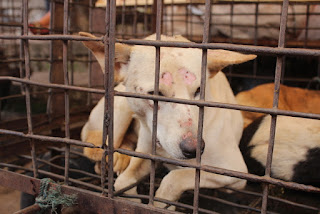For sale: Bat viruses in ‘extreme market’
Indonesia's 8.9 per cent death rate for Covid-19 infections is the second highest in the world, just behind Italy nudging ten per cent.
Yet authorities are shunning demands to shut Tomohon’s bushmeat market in North Sulawesi, an alleged source of the disease. It’s similar to the mixed-animals outlet in Wuhan, China, reputed source of the Covid-19 killer virus now sweeping the world after jumping species.
The Indonesian inaction ignores clear scientific evidence showing a one-in-four chance local bats sold for human consumption carry coronavirus.
A freely available scholarly report Bat Coronavirus of Pteropus alecto from GorontaloProvince described Indonesia as a ‘reservoir for viruses’. (The Latin term refers to black flying foxes, also found in Australia).
The Indonesian paper forecast dangers and urged action more than a year before the pandemic hit:
“Increasing contact between wildlife and humans leads to greater risk of human exposure to pathogens, both well-known and new.
‘Development of early warning systems … (are) urgently needed by government agencies, research, and academic institutions in order to better serve and protect the public.’
Internationally Covid-19 has so far taken 30,000 lives, including 114 in Indonesia. The deaths are the highest in Southeast Asia and testing numbers low. The nation next door has around 270 million people. It’s the world’s fourth most populous country.
The Tomohon traditional market was last week (w/end 28 Mar) still selling butchered domestic animals plus pythons, rats, bats, wild pig and other meats openly displayed on unrefrigerated counters close to vegetable and fruit stalls.
A death row of metal cages stands opposite. The dogs and cats are snared with a noose, dragged to a hatch and bludgeoned. Hairs are burned off with a flame thrower before the animals are gutted.
Although many cats look as though they’d be at home purring on windowsills, the dogs appear forlorn, mangy and battle scarred. They’re not tail wagers drooling for pats.
Just outside the market and about 200 metres from the battering and bloodletting a large government poster urges consumers to stop eating dogs and cats. It reads in English: ‘Love for Animals’. A few years ago the slaughter was billed as a tourist attraction.
At a 6 March meeting in Tomohon convened by the local government to discuss the Covid-19 outbreak, participants circulated the Bat Coronavirus report published in The International Journal of Tropical Veterinary and Biomedical Research in late 2018. The publisher is the Syiah Kuala University’s veterinary medicine faculty in Aceh, north Sumatra.
The 13 Indonesian scientists found 24 of 95 rectal swab samples from the flying mammals ‘suggested as presumptive positive to Bat CoV (coronavirus) … (these) are potentially zoonotic (an animal disease that can infect humans). Bats are one of the locals’ ‘favourite meats.’The authors said their findings could serve as an early warning to support global monitoring systems and report the emergence of bats’ coronavirus. These have the potential to ‘become dangerous pathogens to human health’.
It’s not known if the Indonesian bat virus is identical to the one from Wuhan.
Tomohon (population 110,000) is 25 kilometres south of the provincial capital Manado and a degree north of the equator.
Meats and live beasts sold in the hilltown market are sourced locally or trucked from adjacent Gorontalo where most residents are Muslims. Few eat pigs and dogs which are considered scavengers and prohibited.
About two-thirds of the North Sulawesi population is Christian. They consume exotic meats.
Animal welfare activists based in Europe have long tried getting wild and domestic creature trade banned on grounds of cruelty and conservation. They’ve been flicked away by claims the meats are customary delicacies according to Frank Delano Manus. (below, left)
He runs the Animal Friends Manado Indonesia (AFMI) shelter in Tomohon. It’s funded by an Indonesian philanthropist Anna Parengkuan-Supit now living in Germany.
“Some dogs carry the potentially fatal disease rabies which can be passed to humans through bites,” Manus said. “Now we know bats are infected with coronavirus. This goes beyond animal cruelty to a serious matter of public health.
“Last year I hand delivered a letter signed by nine NGOs to President Joko Widodo’s office urging the extreme market trade be stopped. It was passed on to the Ministry of Agriculture. Nothing was done.”
Manus, 39, said he’d been threatened for campaigning, but was tolerated because he was a local. He’d worked on a West Australian dairy farm so knew of Western attitudes to animal welfare.
”We’ve
been lobbying to close the extreme part of Tomohon market and other live animal
markets in the province since February 2018,” said Lola Webber, director of the
Change for Animals Foundation, a UK registered charity and one of the
letter signatories.
After the 6 March meeting attended by about 25 government officials and local NGOs, rumours surfaced that the extreme food market would be shuttered. In a statement Mayor Jimmy Feidie Eman said:
"We have never issued an instruction
to close it (the market) related to the outbreak of coronavirus. It is
requested that the people of Tomohon
City not be misled by
hoaxes."
First published in Pearls and Irritations, 1 April 2020: https://johnmenadue.com/bat-viruses-in-indonesia-by-duncan-graham/









No comments:
Post a Comment